#mt paektu
Text
I was waiting in some weird town to get on a train to this facility (?) inside Mt. Paektu. I managed to befriend someone before finally getting on the train. When we arrived at the facility, the mountain started erupting and everyone got boiled alive.
#dream#mt paektu#mount paektu#paektu#paektu mountain#town#train#friendship#erruption#body horror tw#gore tw#death tw#horror#nightmare
503 notes
·
View notes
Photo
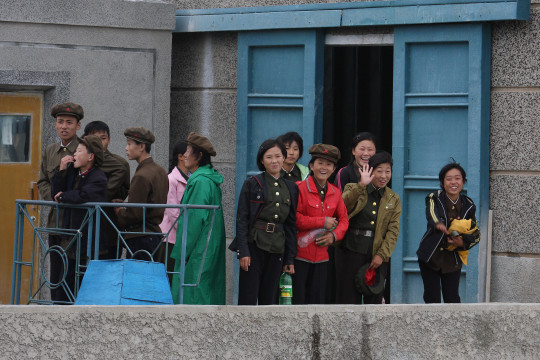
Visitors to Mt Paektu (2010)
5 notes
·
View notes
Text
In February of last year, Donggang Jinhui Foodstuff, a seafood-processing company in Dandong, China, threw a party. It had been a successful year: a new plant had opened, and the company had doubled the amount of squid that it exported to the United States. The party, according to videos posted on Douyin, the Chinese version of TikTok, featured singers, instrumentalists, dancers, fireworks, and strobe lights. One aspect of the company’s success seems to have been its use of North Korean workers, who are sent by their government to work in Chinese factories, in conditions of captivity, to earn money for the state. A seafood trader who does business with Jinhui recently estimated that it employed between fifty and seventy North Koreans. Videos posted by a company representative show machines labelled in Korean, and workers with North Korean accents explaining how to clean squid. At the party, the company played songs that are popular in Pyongyang, including “People Bring Glory to Our Party” (written by North Korea’s 1989 poet laureate) and “We Will Go to Mt. Paektu” (a reference to the widely mythologized birthplace of Kim Jong Il). Performers wore North Korean colors, and the country’s flag billowed behind them; in the audience, dozens of workers held miniature flags.
Drone footage played at the event showed off Jinhui’s twenty-one-acre, fenced-in compound, which has processing and cold-storage facilities and what appears to be a seven-floor dormitory for workers. The company touted a wide array of Western certifications from organizations that claim to check workplaces for labor violations, including the use of North Korean workers. When videos of the party were posted online, a commenter—presumably befuddled, because using these workers violates U.N. sanctions—asked, “Aren’t you prohibited from filming this?”
Like Jinhui, many companies in China rely on a vast program of forced labor from North Korea. (Jinhui did not respond to requests for comment.) The program is run by various entities in the North Korean government, including a secretive agency called Room 39, which oversees activities such as money laundering and cyberattacks, and which funds the country’s nuclear- and ballistic-missile programs. (The agency is so named, according to some defectors, because it is based in the ninth room on the third floor of the Korean Workers’ Party headquarters.) Such labor transfers are not new. In 2012, North Korea sent some forty thousand workers to China. A portion of their salaries was taken by the state, providing a vital source of foreign currency for Party officials: at the time, a Seoul-based think tank estimated that the country made as much as $2.3 billion a year through the program. Since then, North Koreans have been sent to Russia, Poland, Qatar, Uruguay, and Mali.
In 2017, after North Korea tested a series of nuclear and ballistic weapons, the United Nations imposed sanctions that prohibit foreign companies from using North Korean workers. The U.S. passed a law that established a “rebuttable presumption” categorizing work by North Koreans as forced labor unless proven otherwise, and levying fines on companies that import goods tied to these workers. China is supposed to enforce the sanctions in a similar manner. Nevertheless, according to State Department estimates, there are currently as many as a hundred thousand North Koreans working in the country. Many work at construction companies, textile factories, and software firms. Some also process seafood. In 2022, according to Chinese officials running pandemic quarantines, there were some eighty thousand North Koreans just in Dandong, a hub of the seafood industry.
Last year, I set out with a team of researchers to document this phenomenon. We reviewed leaked government documents, promotional materials, satellite imagery, online forums, and local news reports. We watched hundreds of cell-phone videos published on social-media sites. In some, the presence of North Koreans was explicit. Others were examined by experts to detect North Korean accents, language usage, and other cultural markers. Reporting in China is tightly restricted for Western reporters. But we hired Chinese investigators to visit factories and record footage of production lines. I also secretly sent interview questions, through another group of investigators and their contacts, to two dozen North Koreans—twenty workers and four managers—who had recently spent time in Chinese factories. Their anonymous responses were transcribed and sent back to me.
The workers, all of whom are women, described conditions of confinement and violence at the plants. Workers are held in compounds, sometimes behind barbed wire, under the watch of security agents. Many work gruelling shifts and get at most one day off a month. Several described being beaten by the managers sent by North Korea to watch them. “It was like prison for me,” one woman said. “At first, I almost vomited at how bad it was, and, just when I got used to it, the supervisors would tell us to shut up, and curse if we talked.” Many described enduring sexual assault at the hands of their managers. “They would say I’m fuckable and then suddenly grab my body and grope my breasts and put their dirty mouth on mine and be disgusting,” a woman who did product transport at a plant in the city of Dalian said. Another, who worked at Jinhui, said, “The worst and saddest moment was when I was forced to have sexual relations when we were brought to a party with alcohol.” The workers described being kept at the factories against their will, and being threatened with severe punishment if they tried to escape. A woman who was at a factory called Dalian Haiqing Food for more than four years said, “It’s often emphasized that, if you are caught running away, you will be killed without a trace.”
In all, I identified fifteen seafood-processing plants that together seem to have used more than a thousand North Korean workers since 2017. China officially denies that North Korean laborers are in the country. But their presence is an open secret. “They are easy to distinguish,” a Dandong native wrote in a comment on Bilibili, a video-sharing site. “They all wear uniform clothes, have a leader, and follow orders.” Often, footage of the workers ends up online. In a video from a plant called Dandong Yuanyi Refined Seafoods, a dozen women perform a synchronized dance in front of a mural commemorating Youth Day, a North Korean holiday. The video features a North Korean flag emoji and the caption “Beautiful little women from North Korea in Donggang’s cold-storage facility.” (The company did not respond to requests for comment.) Remco Breuker, a North Korea specialist at Leiden University, in the Netherlands, told me, “Hundreds of thousands of North Korean workers have for decades slaved away in China and elsewhere, enriching their leader and his party while facing unconscionable abuse.”
In late 2023, an investigator hired by my team visited a Chinese plant called Donggang Xinxin Foodstuff. He found hundreds of North Korean women working under a red banner that read, in Korean, “Let’s carry out the resolution of the 8th Congress of the Workers’ Party.” (The company did not respond to requests for comment.) Soon afterward, the investigator visited a nearby plant called Donggang Haimeng Foodstuff, and found a North Korean manager sitting at a wooden desk with two miniature flags, one Chinese and one North Korean. The walls around the desk were mostly bare except for two portraits of the past North Korean leaders Kim Il Sung and Kim Jong Il. The manager took our investigator to the workers’ cafeteria to eat a North Korean cold-noodle dish called naengmyeon, and then gave him a tour of the processing floor. Several hundred North Korean women dressed in red uniforms, plastic aprons, and white rubber boots stood shoulder to shoulder at long metal tables under harsh lights, hunched over plastic baskets of seafood, slicing and sorting products by hand. “They work hard,” the manager said. The factory has exported thousands of tons of fish to companies that supply major U.S. retailers, including Walmart and ShopRite. (A spokesperson for Donggang Haimeng said that it does not hire North Korean workers.)
At times, China aggressively conceals the existence of the program. Alexander Dukalskis, a political-science professor at University College Dublin, said that workers have a hard time making their conditions known. “They’re in a country where they may not speak the language, are under surveillance, usually living collectively, and have no experience in contacting journalists,” he said. In late November, after my team’s investigators visited several plants, authorities distributed pamphlets on the country’s anti-espionage laws. Local officials announced that people who try “to contact North Korean workers, or to approach the workplaces of North Korean workers, will be treated as engaging in espionage activities that endanger national security, and will be punished severely.” They also warned that people who were found to be working in connection with foreign media outlets would face consequences under the Anti-Espionage Act.
Dandong, a city of more than two million people, sits on the Yalu River, just over the border from North Korea. The Sino-Korean Friendship Bridge links Dandong to the North Korean city of Sinuiju. A second bridge, bombed during the Korean War, still extends partway across the river, and serves as a platform from which Chinese residents can view the North Koreans living six hundred yards away. The Friendship Bridge is one of the Hermit Kingdom’s few gateways to the world. Some trade with North Korea is allowed under U.N. sanctions, and nearly seventy per cent of the goods exchanged between that country and China travel across this bridge. At least one department store in Dandong keeps a list of products preferred by North Korean customers. Shops sell North Korean ginseng, beer, and “7.27” cigarettes, named for the date on which the armistice ending the Korean War was signed. The city is home to a museum about the conflict, officially called the Memorial Hall of the War to Resist U.S. Aggression and Aid Korea. On boat tours, Chinese tourists purchase bags of biscuits to toss to children on the North Korean side of the river.
Government officials carefully select workers to send to China, screening them for their political loyalties to reduce the risk of defections. To qualify, a person must generally have a job at a North Korean company and a positive evaluation from a local Party official. “These checks start at the neighborhood,” Breuker said. Candidates who have family in China, or a relative who has already defected, can be disqualified. For some positions, applicants under twenty-seven years of age who are unmarried must have living parents, who can be punished if they try to defect, according to a report from the South Korean government; applicants over twenty-seven must be married. North Korean authorities even select for height: the country’s population is chronically malnourished, and the state prefers candidates who are taller than five feet one, to avoid the official embarrassment of being represented abroad by short people. Once selected, applicants go through pre-departure training, which can last a year and often includes government-run classes covering everything from Chinese customs and etiquette to “enemy operations” and the activities of other countries’ intelligence agencies. (The North Korean government did not respond to requests for comment.)
The governments of both countries coördinate to place workers, most of whom are women, with seafood companies. The logistics are often handled by local Chinese recruitment agencies, and advertisements can be found online. A video posted on Douyin this past September announced the availability of twenty-five hundred North Koreans, and a commenter asked if they could be sent to seafood factories. A post on a forum advertised five thousand workers; a commenter asked if any spoke Mandarin, and the poster replied, “There is a team leader, management, and an interpreter.” A company called Jinuo Human Resources posted, “I am a human-resources company coöperating with the embassy, and currently have a large number of regular North Korean workers.” Several people expressed interest. (The company did not respond to requests for comment.)
Jobs in China are coveted in North Korea, because they often come with contracts promising salaries of around two hundred and seventy dollars a month. (Similar work in North Korea pays just three dollars a month.) But the jobs come with hidden costs. Workers usually sign two- or three-year contracts. When they arrive in China, managers confiscate their passports. Inside the factories, North Korean workers wear different uniforms than Chinese workers. “Without this, we couldn’t tell if one disappeared,” a manager said. Shifts run as long as sixteen hours. If workers attempt to escape, or complain to people outside the plants, their families at home can face reprisals. One seafood worker described how managers cursed at her and flicked cigarette butts. “I felt bad, and I wanted to fight them, but I had to endure,” she said. “That was when I was sad.”
Workers get few, if any, holidays or sick days. At seafood plants, the women sleep in bunk beds in locked dormitories, sometimes thirty to a room. One worker, who spent four years processing clams in Dandong, estimated that more than sixty per cent of her co-workers suffered from depression. “We regretted coming to China but couldn’t go back empty-handed,” she said. Workers are forbidden to tune in to local TV or radio. They are sometimes allowed to leave factory grounds—say, to go shopping—but generally in groups of no more than three, and accompanied by a minder. Mail is scrutinized by North Korean security agents who also “surveil the daily life and report back with official reports,” one manager said. Sometimes the women are allowed to socialize. In a video titled “North Korean beauties working in China play volleyball,” posted in 2022, women in blue-and-white uniforms exercise on the grounds of the Dandong Omeca Food seafood plant. (The company that owns the plant did not respond to requests for comment.) A commenter wrote, “The joy of poverty. That’s just how it is.”
Factories typically give the women’s money to their managers, who take cuts for themselves and the government, and hold on to the rest until the workers’ terms in China end. Kim Jieun, a North Korean defector who now works for Radio Free Asia, said that companies tell workers their money is safer this way, because it could be stolen in the dormitories. But, in the end, workers often see less than ten per cent of their promised salary. One contract that I reviewed stipulated that around forty dollars would be deducted each month by the state to pay for food. More is sometimes deducted for electricity, housing, heat, water, insurance, and “loyalty” payments to the state. Managers also hold on to wages to discourage defections. The women have been warned, Kim added, that if they try to defect “they will be immediately caught by Chinese CCTV cameras installed everywhere.” This past October, Chinese authorities repatriated around six hundred North Korean defectors. “China does not recognize North Korean defectors as refugees,” Edward Howell, who teaches politics at Oxford University, told me. “If they are caught by Chinese authorities, they will be forcibly returned to the D.P.R.K., where they face harsh punishment in labor camps.”
Chinese companies have significant incentives to use North Korean workers. They’re typically paid only a quarter of what local employees earn. And they are generally excluded from mandatory social-welfare programs (regarding retirement, medical treatment, work-related injury, and maternity), which further reduces costs. In 2017, Dandong’s Commerce Bureau announced a plan to create a cluster of garment factories that would use North Korean labor. The bureau’s Web site noted that all such workers undergo political screenings to make sure they are “rooted, red, and upright.” “The discipline among the workers is extremely strong,” it added. “There are no instances of absenteeism or insubordination toward leadership, and there are no occurrences of feigning illness or delaying work.” China’s Ministry of Foreign Affairs did not respond to questions for this piece, but last year the Chinese Ambassador to the U.N. wrote that China has abided by sanctions even though it has sustained “great losses” as a result. A spokesperson for the Ministry of Foreign Affairs recently said that China and North Korea have “enjoyed long-standing friendly ties,” adding, “The United States needs to draw lessons, correct course, step up to its responsibility, stop heightening the pressure and sanctions, stop military deterrence, and take effective steps to resume meaningful dialogue.”
North Koreans face difficult circumstances across industries. In January of this year, more than two thousand workers rioted in Jilin Province, breaking sewing machines and kitchen utensils, when they learned that their wages would be withheld. Many North Koreans—perhaps thousands—work in Russian logging, in brutal winter weather without proper clothing. Hundreds have been found working in the Russian construction industry; some lived in shipping containers or in the basements of buildings under construction, because better accommodations were not provided. One recounted working shifts that lasted from 7:30 A.M. to 3 A.M. In preparation for the 2018 and 2022 World Cups, held in Russia and Qatar, thousands of North Koreans were sent to build stadiums and luxury apartments. A subcontractor who worked alongside the North Koreans in Russia told the Guardian that they lived in cramped spaces, with as many as eight people packed into a trailer, in an atmosphere of fear and abuse like “prisoners of war.”
Although it’s illegal in the U.S. to import goods made with North Korean labor, the law can be difficult to enforce. Some eighty per cent of seafood consumed in America, for example, is imported, and much of it comes from China through opaque supply chains. To trace the importation of seafood from factories that appear to be using North Korean labor, my team reviewed trade data, shipping contracts, and the codes that are stamped on seafood packages to monitor food safety. We found that, since 2017, ten of these plants have together shipped more than a hundred and twenty thousand tons of seafood to more than seventy American importers, which supplied grocery stores including Walmart, Giant, ShopRite, and the online grocer Weee! The seafood from these importers also ended up at major restaurant chains, like McDonald’s, and with Sysco, the largest food distributor in the world, which supplies almost half a million restaurants, as well as the cafeterias on American military bases, in public schools, and for the U.S. Congress. (Walmart, Weee!, and McDonald’s did not respond to requests for comment. Giant’s parent company, Ahold Delhaize, and ShopRite’s parent company, Wakefern, said their suppliers claimed that they currently do not source from the Chinese plant in question, and added that audit reports showed no evidence of forced labor.)
Two of the plants that investigators from my team visited—Dandong Galicia Seafood and Dalian Haiqing Food—had an estimated fifty to seventy North Korean workers apiece. One worker who has been employed at Galicia said that the managers are “so stingy with money that they don’t allow us to get proper medical treatment even when we are sick.” Galicia and Haiqing have shipped roughly a hundred thousand tons of seafood to American importers since 2017, and Haiqing also shipped to an importer that supplies the cafeterias of the European Parliament. (Dalian Haiqing Food said that it “does not employ overseas North Korean workers.” Dandong Galicia Seafood did not respond to requests for comment. One of the U.S. importers tied to Haiqing, Trident Seafoods, said that audits “found no evidence or even suspicion” of North Korean labor at the plant. Several companies, including Trident, High Liner, and Sysco, said that they would sever ties with the plant while they conducted their own investigations. A spokesperson for the European Parliament said that its food contractor did not supply seafood from the plant.) Breuker, from Leiden University, told me that American customers quietly benefit from this arrangement. “This labor-transfer system is for North Korea and China as economically successful as it is morally reprehensible,” he said. “It’s also a boon for the West because of the cheap goods we get as a result.”
North Korea doesn’t just export seafood workers; it also exports fish—another means by which the government secures foreign currency. Importing North Korean seafood is forbidden by U.N. sanctions, but it also tends to be inexpensive, which encourages companies to skirt the rules. Sometimes Chinese fishing companies pay the North Korean government for illegal licenses to fish in North Korea’s waters. Sometimes they buy fish from other boats at sea: a letter from a North Korean, leaked in 2022, proposed selling ten thousand tons of squid to a Chinese company in return for more than eighteen million dollars and five hundred tons of diesel fuel. Sometimes the seafood is trucked over the border. This trade is poorly hidden. In October, a Chinese man who said his last name was Cui posted a video on Douyin advertising crabs from North Korea. When someone commented, “The goods can’t be shipped,” Cui responded with laughing emojis. In other videos, he explained that he operated a processing plant in North Korea, and gave information on the timing of shipments that he planned to send across the border. When I contacted Cui, he said that he had stopped importing North Korean seafood in 2016 (though the videos were actually from last year), and added, “It’s none of your business, and I don’t care who you are.” My team found that seafood from North Korea was imported by several American distributors, including HF Foods, which supplies more than fifteen thousand Asian restaurants in the U.S. (HF Foods did not respond to requests for comment.)
Chinese companies often claim that they are in compliance with labor laws because they have passed “social audits,” which are conducted by firms that inspect worksites for abuses. But half the Chinese plants that we found using North Korean workers have certifications from the Marine Stewardship Council, which is based in the U.K. and sets standards for granting sustainability certifications, but only to companies that have also passed social audits or other labor assessments. (Jackie Marks, an M.S.C. spokesperson, told me that these social audits are conducted by a third party, and that “We make no claims about setting standards on labor.”) Last year, one of my team’s investigators visited a seafood-processing plant in northeastern China called Dandong Taifeng Foodstuff. The company has been designated a “national brand,” a status reserved for the country’s most successful companies, and supplies thousands of tons of seafood to grocery stores in the U.S. and elsewhere. At the plant, our investigator was given a tour by a North Korean manager. On the factory floor, which was lit by bright fluorescent bulbs, more than a hundred and fifty North Korean women, most of them under thirty-five years old, wore head-to-toe white protective clothing, plastic aprons, white rubber boots, and red gloves that went up to their elbows. They stood with their heads down, moving red, yellow, and blue plastic bins of seafood. Water puddled at their feet. “Quick, quick,” one woman said to the other members of her small group. (Taifeng did not respond to requests for comment.) Just weeks after that visit, the plant was recertified by the Marine Stewardship Council.
Marcus Noland, who works at the Peterson Institute for International Economics, said, of social audits within the seafood industry, “The basic stance appears to be ‘See no evil.’ ” Skepticism of such audits is growing. In 2021, the U.S. State Department said that social audits in China are generally inadequate for identifying forced labor, in part because auditors rely on government translators and rarely speak directly to workers. Auditors can be reluctant to anger the companies that have hired them, and workers face reprisals for reporting abuses. This past November, U.S. Customs and Border Protection advised American companies that a credible assessment would require an “unannounced independent, third-party audit” and “interviews completed in native language.” Liana Foxvog, who works at a nonprofit called the Worker Rights Consortium, argues that assessments should involve other checks too, including off-site worker interviews. But she noted that most audits in China fall short even of C.B.P.’s standards.
Joshua Stanton, an attorney based in Washington, D.C., who helped draft the American law that banned goods produced with North Korean labor, argues that the government is not doing enough to enforce it. “The U.S. government will need to put more pressure on American companies, and those companies need to be more diligent about their suppliers and their supply chains, or face stricter sanctions,” he said. Chris Smith, a Republican congressman from New Jersey and a specialist on China, noted that social audits “create a Potemkin village.” He added, “The consequence is that millions of dollars, even federal dollars, are going to Chinese plants using North Korean workers, and that money then goes right into the hands of Kim Jong Un’s regime, which uses the money to arm our adversaries and repress its own people.”
Late last year, when I set out to contact North Koreans who had been sent to China, I ran into significant obstacles. Western journalists are barred from entering North Korea, and citizens of the country are strictly prohibited from talking freely to reporters. I hired a team of investigators in South Korea who employ contacts in North Korea to get information out of the country for local and Western news outlets—for example, about food shortages, power outages, or the rise of anti-government graffiti. The investigators compiled a list of two dozen North Koreans who had been dispatched to a half-dozen different Chinese factories, most of whom had since returned home. The investigators’ contacts then met with these workers in secret, one-on-one, so that the workers wouldn’t know one another’s identity. The meetings usually occurred in open fields, or on the street, where it’s harder for security agents to conduct surveillance.
The workers were told that their responses would be shared publicly by an American journalism outlet. They faced considerable risk speaking out; experts told me that, if they were caught, they could be executed, and their families put in prison camps. But they agreed to talk because they believe that it is important for the rest of the world to know what happens to workers who are sent to China. The North Korean contacts transcribed their answers by hand, and then took photos of the completed questionnaires and sent them, using encrypted phones, to the investigators, who sent them to me. North Koreans who are still in China were interviewed in a similar fashion. Because of these layers of protection, it is, of course, impossible to fully verify the content of the interviews. But the responses were reviewed by experts to make sure that they are consistent with what is broadly known about the work-transfer program, and in line with interviews given by North Korean defectors. (Recently, the investigators checked in on the interviewers and interviewees, and everyone was safe.)
In their answers, the workers described crushing loneliness. The work was arduous, the factories smelled, and violence was common. “They kicked us and treated us as subhuman,” the worker who processed clams in Dandong said. Asked if they could recount any happy moments, most said that there had been none. A few said that they felt relieved when they returned home and got some of their pay. “I was happy when the money wasn’t all taken out,” the woman who did product transport in Dalian said. One woman said that her experience at a Chinese plant made her feel like she “wanted to die.” Another said that she often felt tired and upset while she was working, but kept those thoughts to herself to avoid reprisals. “It was lonely,” she said. “I hated the military-like communal life.”
The most striking pattern was the women’s description of sexual abuse. Of twenty workers, seventeen said that they had been sexually assaulted by their North Korean managers. They described a range of tactics used to coerce them into having sex. Some managers pretended to wipe something from their uniforms, only to grope them. Some called them into their offices as if there were an emergency, then demanded sex. Others asked them to serve alcohol at a weekend party, then assaulted them there. “When they drank, they touched my body everywhere like playing with toys,” a woman said. The woman who did product transport in Dalian said, “When they suddenly put their mouths to mine, I wanted to throw up.” If the women didn’t comply, the managers could become violent. The worker who was at Haiqing for more than four years said, of her manager, “When he doesn’t get his way sexually, he gets angry and kicks me. . . . He calls me a ‘fucking bitch.’ ” Three of the women said that their managers had forced workers into prostitution. “Whenever they can, they flirt with us to the point of nausea and force us to have sex for money, and it’s even worse if you’re pretty,” another worker at Haiqing said. The worker from Jinhui noted, “Even when there was no work during the pandemic, the state demanded foreign-currency funds out of loyalty, so managers forced workers to sell their bodies.” The worker who spent more than four years at Haiqing said, of the managers, “They forced virgin workers into prostitution, claiming that they had to meet state-set quotas.”
The pandemic made life more difficult for many of the women. When China closed its borders, some found themselves trapped far from home. Often, their workplaces shut down, and they lost their incomes. North Korean workers sometimes pay bribes to government officials to secure posts in China, and, during the pandemic, many borrowed these funds from loan sharks. The loans, typically between two and three thousand dollars, came with high interest rates. Because of work stoppages in China, North Korean workers were unable to pay back their loans, and loan sharks sent thugs to their relatives’ homes to intimidate them. Some of their families had to sell their houses to settle the debts. In 2023, according to Radio Free Asia, two North Korean women at textile plants killed themselves. The worker who told me that she wanted to die said that such deaths are often kept hidden. “If someone dies from suicide, then the manager is responsible, so they keep it under wraps to keep it from being leaked to other workers or Chinese people,” she said.
This past year, pandemic restrictions were lifted, and the border between China and North Korea reopened. In August, some three hundred North Korean workers boarded ten buses in Dandong to go back home. Police officers lined up around the buses to prevent defections. In photos and a video of the event, some of the women can be seen hurriedly preparing to load large suitcases onto a neon-green bus, then riding away across the Friendship Bridge. In September, another three hundred boarded a passenger train to Sinuiju, and two hundred were repatriated by plane. Workers who return face intense questioning by officials. “They asked about every single thing that happened every day from morning to evening in China, about other workers, supervisors, and agents,” the worker who processed clams in Dandong explained. As 2023 ended, the North Korean government began planning to dispatch its next wave of workers. In the past couple of years, according to reporting by Hyemin Son, a North Korean defector who works for Radio Free Asia, labor brokers have requested that Chinese companies pay a large advance; they were being asked to pay ahead of time, one broker told her, because “Chinese companies cannot operate without North Korean manpower.”
Some North Korean workers have yet to go home. One woman said that she has spent the past several years gutting fish at a processing plant in Dalian. She described working late into the night and getting sores in her mouth from stress and exhaustion. In the questionnaire, I had asked about the worst part of her job, and she said, “When I am forced to have sex.” She also described a sense of imprisonment that felt suffocating. “If you show even the slightest attitude, they will treat you like an insect,” she said. “Living a life where we can’t see the outside world as we please is so difficult that it’s killing us.” ♦
15 notes
·
View notes
Text
Myth-making of North Korean leader Kim Jong Un
A look at North Korean leader Kim Jong Un as state news agency KCNA releases photos of Kim riding alone on a large white horse through snowy fields and woods on Mt Paektu, the spiritual homeland of the Kim dynasty.
0 notes
Photo




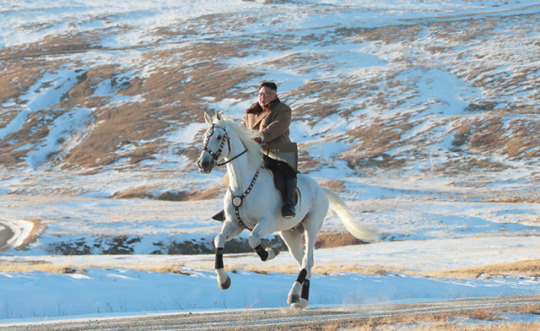


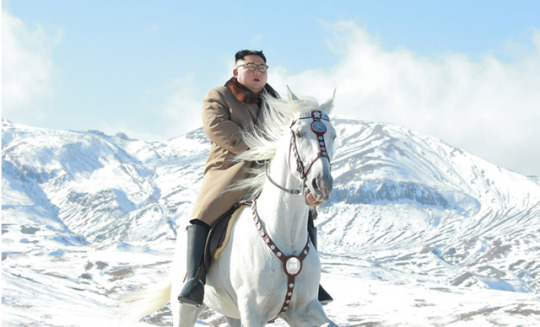
Supreme Leader Kim Jong Un Ascends Mt Paektu on Horseback [October 16 Juche 108 (2019) KCNA]
Kim Jong Un, chairman of the Workers' Party of Korea, chairman of the State Affairs Commission of the Democratic People's Republic of Korea and supreme commander of the armed forces of the DPRK, rode a white horse to the top of Mt Paektu in the first snow.
He was accompanied by senior officials of the WPK Central Committee.
His horseback march in Mt Paektu is a great event of weighty importance in the history of the Korean revolution.
He, atop Mt Paektu on the horseback, recollected with deep emotion the road of arduous struggle he covered for the great cause of building the most powerful country with faith and will as firm as Mt Paektu and days of fast-paced changes and took a bird's-eye view of mountains that looked like the high steep mountains of the revolution he has to pass in high spirits.
Reflected in the dignified mien of Kim Jong Un atop majestic Mt Paektu was the majesty of the illustrious commander looking far into the road of advance of a powerful socialist country that will achieve prosperity with its own efforts, meeting all headwinds with the storm of Mt Paektu.
All the officials who accompanied him to the top of the mountain felt overflowing emotion and joy and convinced that there will be a great operation to strike the world with wonder again and advance the Korean revolution a step forward.
88 notes
·
View notes
Text




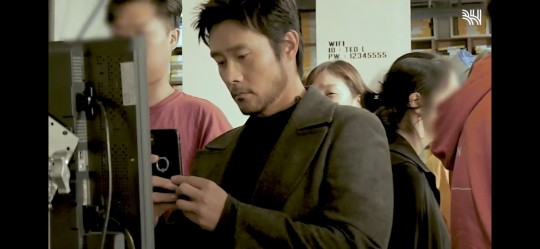

#lee byun hun#ashfall#poster#behind the scenes#Mt Baekdu#mountain baekdu#baekdu mountain#mount baekdu#mount paektu#byung hun lee#lee byunghun
3 notes
·
View notes
Photo

추석 잘 보내세요!
Have a happy Chuseok!
Chuseok is a harvest and family holiday similar to Thanksgiving celebrated by both Koreas, although until recently North Koreans could not celebrate it because, as a traditional holiday, it was regarded as a vestige of a feudal system.
Now we celebrate in many of the same ways as South Koreans, but with some differences.
Honoring ones’ ancestors is an integral part of Chuseok that people on both sides of the border engage in. Charye is the custom of preparing an offering of food as part of an ancestral memorial rite.

In South Korea, the tables can be quite extravagant. The placement of the food also follows special rules, such as fruits and vegetables being placed in the south, meats in the west, soup and rice in the north, and rice cakes and drinks in the east.
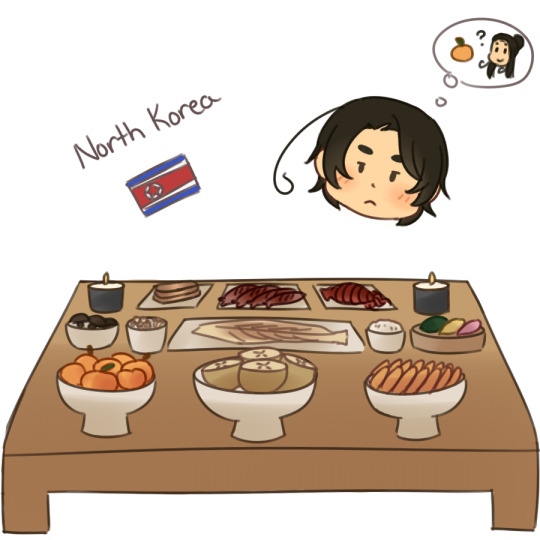
In the North, the table is usually a more modest affair. Unlike in the South, fresh fruit and meat are harder to come by, so they are usually prepared in advance and are often dried. For some North Koreans, this is the only time of year these foods will be available to them, so the holiday is highly anticipated. Also unlike the South, the placement of food on the table doesn’t matter as much--we just place foods our ancestors were fond of or that we enjoy ourselves.
I cannot quite remember what foods Gojoseon liked...I hope she would have liked tangerines as I do.
-----
Previous Chuseok posts: 2017, 2020
Note: The yellow flowers are rhododendrons, which are known to grow on Mt. Paektu (where I hc Gojoseon was buried).
#hetalia#aph#hws#aph north korea#hws north korea#aph korea#hws korea#aph south korea#hws south korea#ic questions
201 notes
·
View notes
Photo
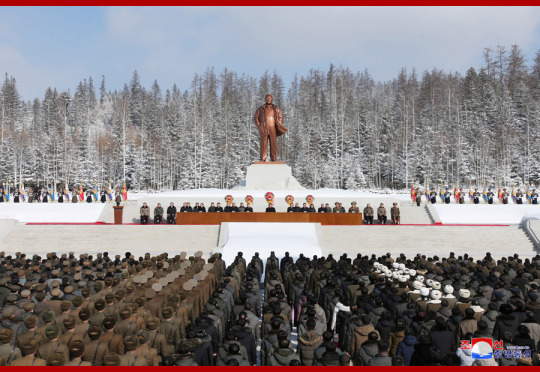
National Meeting to Celebrate 80th Birth Anniversary of Chairman Kim Jong Il Held
Pyongyang, February 16 (KCNA) -- The people of the DPRK, who are dynamically advancing toward a fresh victory along the bright path of our style socialism under the guidance of the great Workers' Party of Korea, are splendidly celebrating the Day of the Shining Star, the greatest auspicious national holiday, with high political enthusiasm and proud labor achievements.
On the occasion of the significant February holiday, all the civilians and servicepersons of the whole country are paying their highest tribute and eternal glory to Chairman Kim Jong Il. They are recollecting in humble reverence the noble life of the Chairman shining in the sacred path of the Juche revolution and the immortal revolutionary exploits he performed before the country and the people, the times and the history.
A national meeting to commemorate the 80th birth anniversary of Chairman Kim Jong Il took place in front of his statue in Samjiyon City, the holy land of revolution, on Feb. 15.
Samjiyon City where majestic figure of Mt Paektu, the sacred mountain of revolution, is in sight was filled with boundless reverence for the Chairman who was born as the Shining Star of Mt Paektu and continued his forced march of warm love and devotion for the country and the people in his lifetime to provide a solid foundation of our state powerful and prosperous and with delight and pleasure of the participants to splendidly celebrate the great auspicious holiday of the nation on the glorious land turned into an ideal land of people.
Kim Jong Un, general secretary of the Workers' Party of Korea and president of the State Affairs of the Democratic People's Republic of Korea, attended the meeting.
When the respected General Secretary appeared, all the participants burst into stormy cheers "hurrah!" upon him who has put the might of socialist Korea, the highest patriotic heritage of the Chairman, and its position on the highest level with his ceaseless revolutionary leadership and carried into brilliant reality the Chairman's cause of building a powerful country.
A floral basket in the name of Kim Jong Un was laid in front of the statue of the Chairman.
Also laid before the statue were floral baskets in the names of the WPK Central Committee, the State Affairs Commission of the DPRK, the Standing Committee of the Supreme People's Assembly of the DPRK and the Cabinet of the DPRK.
The respected Comrade Kim Jong Un together with leading officials of the Party and the government paid high tribute to the statue of the Chairman, the eternal sun of Juche, venerable image of socialist Korea and great sage of the revolution.
Present at the meeting were Choe Ryong Hae, member of the Presidium of the Political Bureau of the Central Committee of the WPK, first vice-president of the State Affairs Commission of the DPRK and chairman of the Standing Committee of the Supreme People's Assembly, Jo Yong Won, member of the Presidium of the Political Bureau and secretary for Organizational Affairs of the WPK Central Committee, and Kim Tok Hun, member of the Presidium of the Political Bureau of the Central Committee of the WPK, vice-president of the State Affairs Commission of the DPRK and premier of the Cabinet.
Also present were Ri Il Hwan, Kim Jae Ryong, Kim Yong Chol, Jong Kyong Thaek, Kim Yo Jong, O Il Jong, Ho Chol Man, Pak Thae Dok, Kim Hyong Sik, Pak Myong Sun, Ri Chol Man, Kim Song Nam, Jon Hyon Chol, Yang Sung Ho, Ri Son Gwon, Ri Thae Sop, U Sang Chol and other Party and government leading officials, senior officials of ministries and national institutions, officials and working people in Ryanggang Province and Samjiyon City, and commanding officers and shock brigade members of 216 Division.
Ri Yong Gil and other senior officials of the armed forces organs and officers and men of the Korean People's Army and the Public Security Forces were present at the meeting.
Ri Il Hwan, member of the Political Bureau and secretary of the Central Committee of the WPK, made a report "Let us accomplish to the end the cause of the great Comrade Kim Jong Il with the revolutionary spirit of Paektu".
He said that all the people across the country greeting the greatest auspicious holiday of the nation in the middle of the historic advance toward the overall development of our style socialist construction recall with deep emotion the profundity and significance of the February of Korea while looking back on the most proud era in the nation's history spanning 5 000 years marked by leaping progress based on the revolutionary heritage left by the Chairman under the uplifted red flag of the revolution shining with his immortal august name.
Recalling the noble revolutionary career of the peerlessly great man characterized by his unusual birth and growth, the reporter praised the undying feats of the Chairman who instilled the spirit of self-respect into the people and provided the best asset for building a powerful country.
Stressing that the cause with great idea and heritage will be invincible, he called on all the Party members, other people and servicepersons of the People's Army to uphold the leadership of the Party Central Committee led by Kim Jong Un with ardent loyalty and truthful revolutionary practice and turn socialist Korea, fruition of the life-long dedication of the Chairman into a developed and highly civilized prosperous country looked up to by the world.
The participants, looking back with great pride on the emotion-charged days when they worked and struggled upholding the Chairman's idea and cause, hardened the conviction that his patriotic desire for building a powerful country will surely come true as there is the outstanding leadership of the Party Central Committee.
The meeting showed well the firm will and enthusiasm of the participants to carry to completion the revolutionary cause of Juche that started on Mt Paektu, rallied close around Kim Jong Un, build a people's paradise prospering with self-reliance on this land and adorn the new 100 years of the Korean revolution as annals of victory and glory.
10 notes
·
View notes
Text
Hey so i have a lupin oc named Fumihiro and idk i like rambling about my oc’s on here and it’s easier to keep information on here
•Hes mixed Korean and Japanese
•Before meeting the lupin gang, he mostly stole art. Whatever painting or sculpture that was a highlight attraction at some museum he would go and steal it. He doesn’t keep most of the art, rather just makes it a fucked up scavenger hunt but whatever he does keep he brings back to a little personal museum which is just a hut hidden on mt. Paektu and is watched by a monk hes aquanted himself with.
•He met the lupin gang when both of their heists were for the same painting. After the fact of failing and not getting the painting, he did run away only to run into lupin a few days later.
•His favorite food is pork steam buns
•His main tactic for stealing is to go under disguise as an art critic to find his route, then he’ll go in sometime during night and steal whatever he’s after. Usually this is a mission impossible esq method of usung a wire and lowering himself from the ceiling.
•He is a select mute for multiple reasons but the main one is because he relies on being quiet to get his prize
•His outfits are usually comprised of a black form fitting shirt, cargo pants, gloves, and sometimes a bandanna or mask if he needs one to cover his face if there’s cameras he cant avoid
As for his bonds with the lupin gang
Lupin: They respect each other as theives and are pretty close
Fujiko: They dont talk much so mutual disrespect
Jigen: I s..i ship him with jigen maybe. I like enemies to lovers too much. But the initial run in was between the two of them, and their resulting fight over whatever painting they were trying to steal is what alerted security and they begrudgingly helped each other out. Jigen was not happy when lupin came back with some dumb twink saying he’d be working with them.
Goemon: Goemon was extremely suspicious of Fumihiro for multiple reasons when he first started working alongside them but eventually warmed up to him.

Here’s a drawing of him too that I don’t like but is the best I have of him
2 notes
·
View notes
Photo
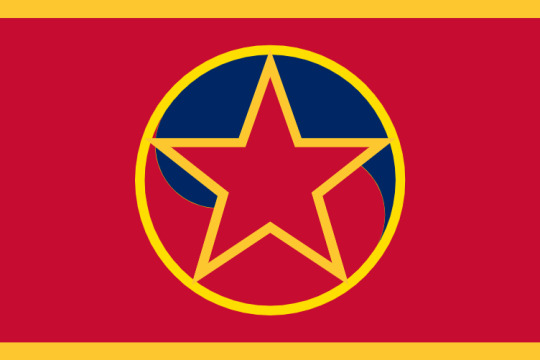
Redesigned Flag Of North Korea
from /r/vexillology
Top comment: **REDESIGNED FLAG OF NORTH KOREA** Gold Symbolizes Equality Blue Symbolizes The Blue Skies At The Top Of Mt. Paektu Red Symbolizes The Workers Red Star Symbolizes The Socialism And The Juche Ideology
22 notes
·
View notes
Video
Liked on YouTube: Singing near Mt Paektu, North Korea https://www.youtube.com/watch?v=tunh034o3S0
1 note
·
View note
Text
Headlines
Historic All-Female Spacewalk Set for Friday at International Space Station
(Reuters) U.S. astronauts Christina Koch and Jessica Meir will make history on Friday when they conduct the first ever all-female spacewalk to replace the power source on the International Space Station (ISS).
California students get extra shuteye
(LI) Some California students will be getting a bit more dreaming. The state has mandated that middle and high schools start a half-hour later--8 and 8:30, respectively--so the kids (at least theoretically) get more sleep. This first-in-the-nation law is sure to disrupt households in which school and work schedules are carefully aligned. But it is based on Academy of Pediatrics guidance that teenagers should get between 8.5 and 9.5 hours of sleep “to function at their best.”
Trump vetoes measure to end his emergency declaration on border wall
(Reuters) Donald Trump has vetoed a joint resolution of Congress that sought to terminate his declaration of a national emergency on the southern border with Mexico, the White House said. Trump used the very first veto of his presidency in March to strike down a similar measure that had cleared the House and Senate. Congress was unable to muster the two-thirds majorities in both chambers to override that veto and is not expected to do so this time.
Mexico’s Slim Supports President’s Objectives
(AP) Mexican billionaire Carlos Slim says he supports President Andrés Manuel López Obrador’s objectives and estimates that he will make investments of more than $5.2 billion through his companies during López Obrador’s six-year term.
U.S. NHC Says 50% Chance for Cyclone Formation Near Southern Mexico
(Reuters) A broad area of low pressure located in the Bay of Campeche, just offshore of the coast of Southern Mexico, has a 50% chance of becoming a cyclone in the next 48 hours, the U.S. National Hurricane Center (NHC) said on Wednesday.
Brazil’s Income Inequality Hits Highest Since at Least 2012
(AP) Brazil’s income inequality in 2018 reached its highest level since the start of the national statistics’ series in 2012, according to data released Wednesday, reflecting an economic downturn that’s taken an outsized toll on the poor.
Separatist protests in Barcelona
(Foreign Policy) Protests continue in Barcelona after Spain’s Supreme Court jailed the leaders who spearheaded a failed Catalan secession bid in 2017. Separatist leaders are pushing for a new referendum, drawing thousands into the streets--with some protesters clashing with police. The independence debate is likely to shape Spain’s national election, set for Nov. 10.
Russia offers to mediate in Syria, asserting its role
(AP) Russia offered Wednesday to mediate a resolution in northern Syria, further asserting Moscow’s role as a regional force, ahead of a mission by U.S. Vice President Mike Pence to press Turkey for a cease-fire in its attack on Syrian Kurdish fighters. Ahead of talks with Pence, Turkish President Recep Tayyip Erdogan defied U.S. economic sanctions, saying the only way its military offensive would end was if Syrian Kurdish fighters leave a designated border area. Erdogan also said he had “no problem” accepting an invitation from Russian President Vladimir Putin to visit Russia soon to discuss Syria. But he threw into doubt a planned Nov. 13 meeting with U.S. President Donald Trump, citing anger over the sanctions that Washington imposed Monday on the NATO ally.
Aid Groups Scramble to Reach Syrians as Battle Lines Shift
(AP) Humanitarian groups in northeastern Syria are scrambling to provide aid to hundreds of thousands of people as rapidly shifting battle lines make it increasingly difficult to reach them.
Three militants, two civilians killed as violence spreads in Kashmir
(Reuters) Indian security forces killed three separatists, while suspected militants shot dead two people on Wednesday, one of the bloodiest days in Kashmir since New Delhi revoked the disputed region’s autonomy more than two months ago.
Forest fires in Lebanon
(Foreign Policy) Lebanon is battling its worst forest fires in decades, leading its government to request help from other countries in the region. The blazes, which began in Lebanon’s western mountains, have also spread to Syria, where two forestry workers have died.
‘Defiant message’ as North Korea’s leader rides a white horse on sacred mountain
(Reuters) Aides to Kim Jong Un are convinced the North Korean leader plans “a great operation”, state media. In the photos released by state news agency KCNA, Kim is seen riding alone on a large white horse through snowy fields and woods on Mt Paektu, the spiritual homeland of the Kim dynasty. It was unclear what the operation might involve, but Kim has often made trips to the sacred mountain at times of major policy endeavors. Analysts say the symbolism underscores North Korea standing up to international sanctions and pressure over its nuclear weapons and ballistic missile programs.
Thai Red Shirt Chiefs Ordered to Pay for 2010 Arson Damage
(AP) Thailand’s Supreme Court on Wednesday ordered three leaders of the Red Shirt political movement to pay 21 million baht ($691,000) compensation to business owners whose commercial buildings were set on fire at the climax of two months of aggressive street protests in 2010.
9 Dead as Guineans Protest President’s Bid to Extend Power
(AP) At least nine people have been killed in three days of protests in Guinea against the president’s bid to extend his time in power, while hospitals are overwhelmed with scores of people wounded, a doctor told The Associated Press on Wednesday.
1 note
·
View note
Photo
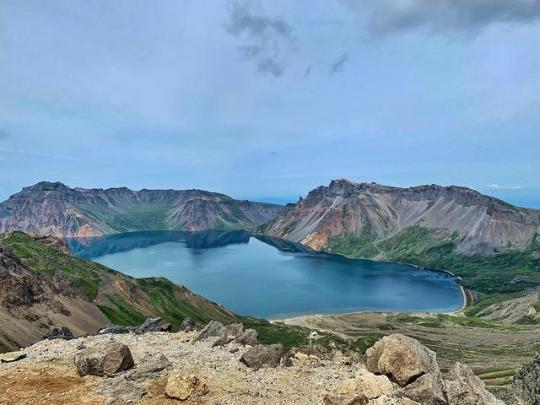
I was incredibly lucky to visit Mt Paektu, North Korea on one of 60 clear days of the year! Beautiful scenes.
1 note
·
View note
Video
Juche 109 (2020) : A Hot Wind of Study Tour of Mt. Paektu Area ✪
6 notes
·
View notes




